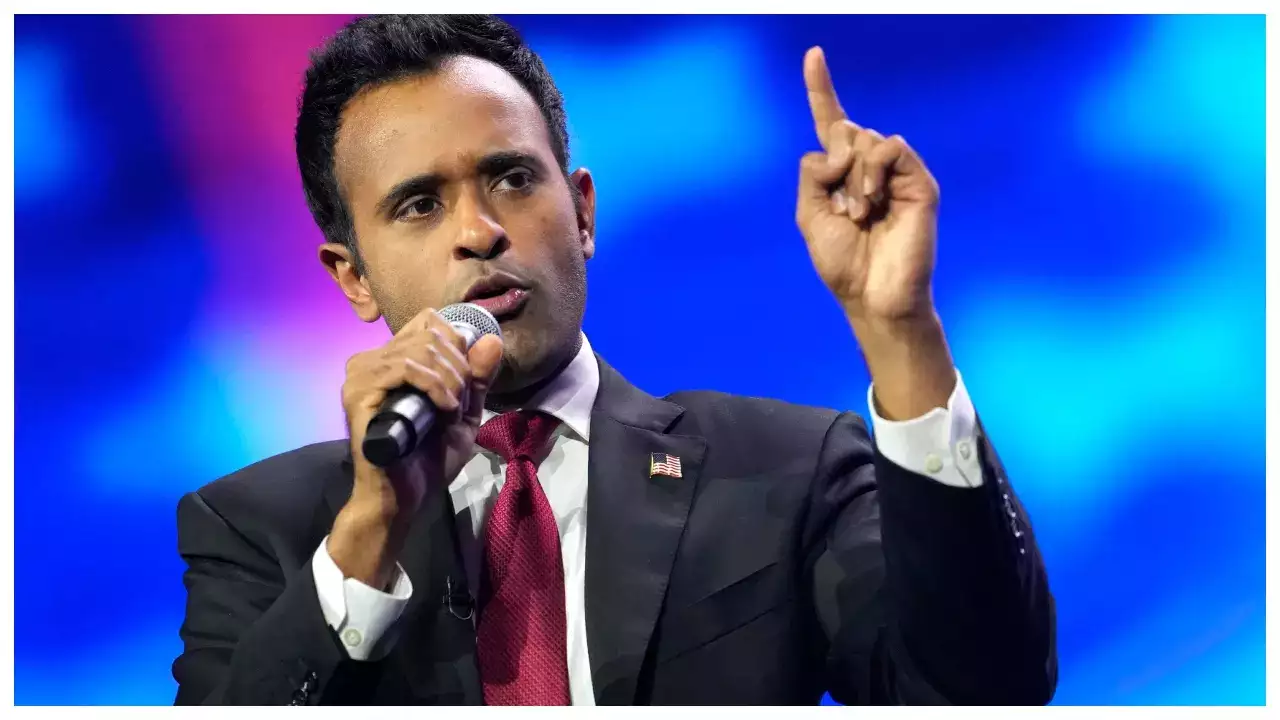A key part of Ramaswamy’s pitch is the simplest: he is young. He mentions his age often, and in Rochester he introduced the memorable fact that, if he is elected and completes two Presidential terms, his older son (he and his wife, Apoorva, a doctor, have two boys) will not yet have entered high school. At the Iowa State Fair, he rapped out a couple of verses of Eminem, a party trick of his since his undergraduate days at Harvard. In contrast to Trump’s boomer inferno —either we’re going back to a better time or we’re going down in flames—Ramaswamy suggests a conservative future. Faith, patriotism, and family have disappeared as pillars, he said on the stump, replaced by “depression, anxiety, fentanyl, suicide.” But that wasn’t the end of the story. He said, “I don’t think we have to be a nation in decline. I think the truth right now is we are a little young, actually—we’re going through our own version of adolescence. . . .You go through that crisis, you lose your self-confidence. You lose your way a little bit. You’re stronger on the other side.”
Of all the ways in which Trump broke the political model, a basic one was in the biography of a Presidential contender. Could anyone—at least anyone able to fund his own campaign—be President now? That idea, prevalent during the populist spring of 2016, has faded since. Fewer progressive outsiders have won national office than many on the left might have hoped, and the Republican Party has largely absorbed the maga movement, avoiding being displaced by it. The novice-candidate model hasn’t really been tested since 2016: no one really knows whether the right vibes and a Molotov cocktail in your hand still beats a political record and voter loyalty, of the sort attached to DeSantis and, more powerfully, Trump.
As recently as this past winter, when he was making waves on Fox News with anti-woke pronouncements, Ramaswamy often sounded callow: bored by political details, shamed by the failure of the anti-Alzheimer’s drug on which he had largely bet his company, and somewhat personally isolated. “I feel like the public advocacy, or whatever you call what I’ve been doing in the last couple of years, has eroded more friendships than new friendships made up for it,” he told Sheelah Kolhatkar then. It felt like a very long way to the Presidency.
It may still be a long way. Last week, Politico reported on a gap in polling that professionals were working to explain—Ramaswamy performs far better in Web-based polls than in telephone ones, which might be explained by an excess of rabid young supporters. But an excess of rabid young supporters is an asset anywhere in politics, especially in a party devoid of youth. One main source of grassroots conservative energy since Biden’s election has been the backlash to the liberal moral consensus that formed during the pandemic and the George Floyd protests, which deepened around the conviction that the climate is in crisis, and that greeted the response to Russia’s invasion of Ukraine. Watching Ramaswamy on the stump reminded me that Biden, who campaigned against Trump’s extremism in 2020 as a pragmatist and a steady hand, has not yet had to defend his investments in climate transformation and the Ukraine war, and made me wonder how effectively he would do so.
For now, Ramaswamy’s rise is demonstrating that conservative populist energy hasn’t fully been tapped. During the Q. & A. session in Rochester, the woman standing next to me shouted out that Kiev had been persecuting Christians, and Ramaswamy quickly added this to the list of Zelensky’s alleged crimes. When someone else implied that China was responsible for covid, he nodded eagerly. “Yes!” Ramaswamy said. “I’m not O.K. with releasing man-made viruses from a bioterrorism lab in Wuhan.” He asked for audience members’ names and agreed with what they said, even when it pulled him nearer to conspiracy; in response, the crowd rose and applauded, and moved nearer to him, too.
After a riff about declaring economic independence from communist China, Ramaswamy worked himself around to a closing. “For too long,” he said, “we have been celebrating our diversity. So much that we forgot all of the ways that we are really just the same as Americans, bound by a common creed that set this nation into motion two hundred and fifty years ago . . . e pluribus unum. From many, one.”
Just in front of him, a young guy with a beard said, with satisfaction, “Based”—the young right’s preferred term of approval. For a moment at least, Ramaswamy had pulled the elemental trick of both a politician and a huckster: making a banal idea seem forgotten, and new. ♦












